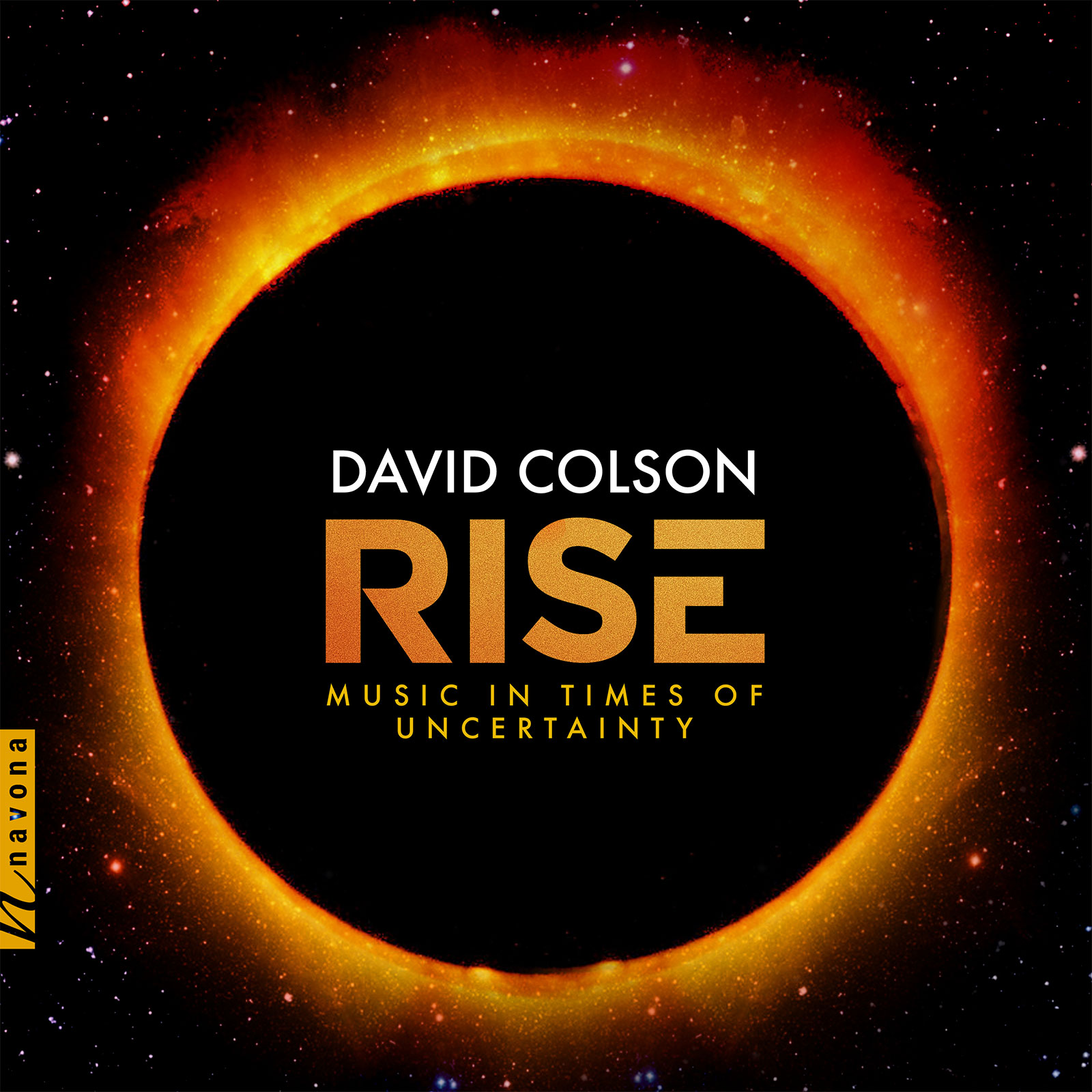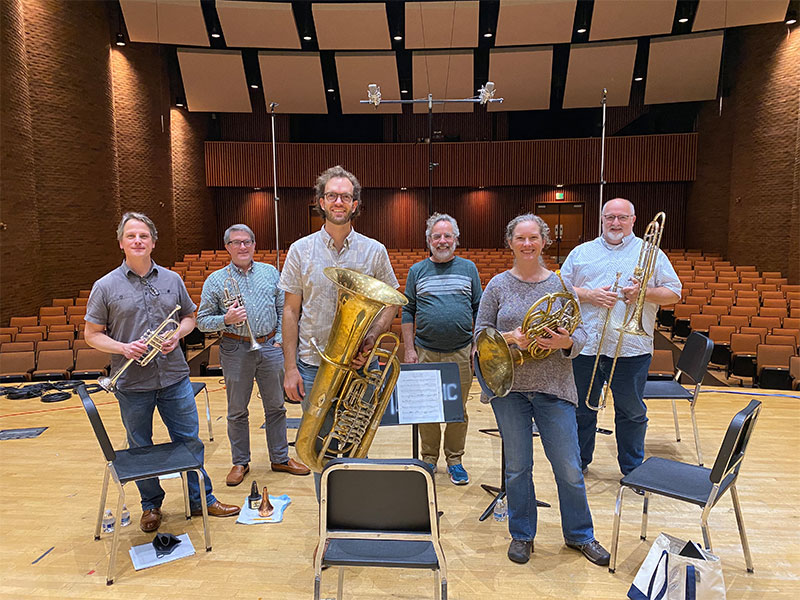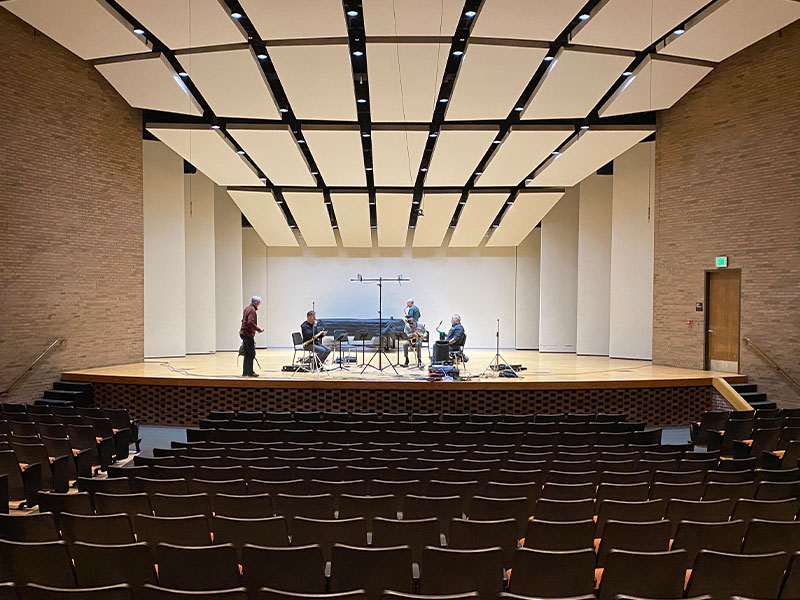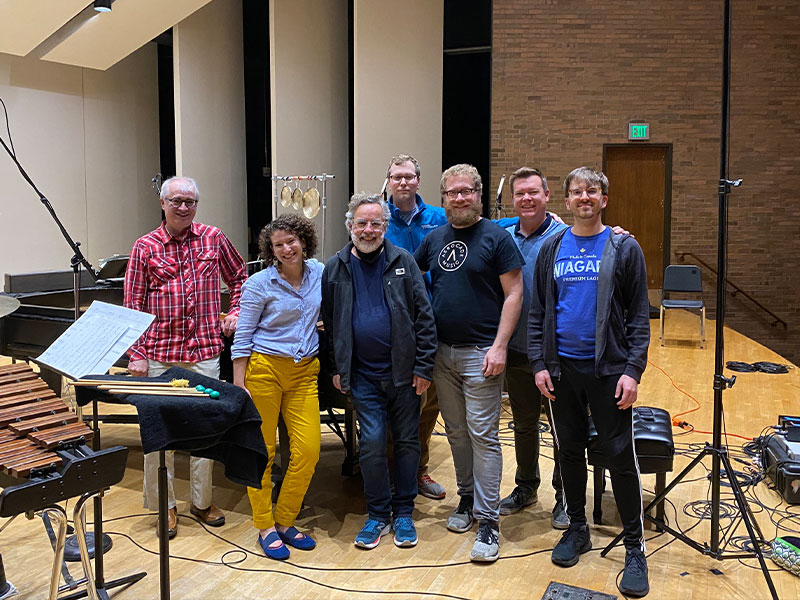Rise
David Colson composer
On RISE: MUSIC IN TIMES OF UNCERTAINTY, composer David Colson employs conventional and innovative chamber combinations alike to express a wide array of emotional content. Drawing upon years of experience as a performer, conductor, and composer, his command over the music and ability to adapt is present on each piece. How We Change for brass quintet pays homage to a dear friend with quick-changing tempos and unequal phrases, which represent the flood of emotions caused by sudden loss. The Wind Is Rising, the Earth lets itself be inhaled for bassoon and percussion, simultaneously primitive and cosmic, calls for respect for the earth. The micro-concerto RISE for piano and percussion quartet highlights various percussion elements to emphasize the performers’ skill and versatility. Finally, Dionysian Mysteries, composed freeform with minimal methodology, allows the saxophone quartet to plumb the depths of their instruments’ capabilities to render raw, emotional sound.
Listen
Stream/Buy
Choose your platform
Track Listing & Credits
| # | Title | Composer | Performer | |
|---|---|---|---|---|
| 01 | How We Change | David Colson | Western Brass Quintet | Scott Thornburg, trumpet; Robert White, trumpet; Lin Foulk Baird, horn; Daniel Mattson, trombone; Chance S. Trottman-Huiet, tuba | 11:34 |
| 02 | The Wind Is Rising, the Earth lets itself be inhaled | David Colson | Benjamin Kamins, bassoon; Matthew Strauss, percussion | 14:41 |
| 03 | RISE: I. Hear the Sun’s Thunder | David Colson | Clocks in Motion Percussion | John Corkill, Kyle Flens, Christopher G. Jones, Sean Kleve - percussion; Clare Longendyke, piano | 3:44 |
| 04 | RISE: II. I am rain, falling slowly on the leaves that shiver and sparkle | David Colson | Clocks in Motion Percussion | John Corkill, Kyle Flens, Christopher G. Jones, Sean Kleve - percussion; Clare Longendyke, piano | 4:42 |
| 05 | RISE: III. we all shine on | David Colson | Clocks in Motion Percussion | John Corkill, Kyle Flens, Christopher G. Jones, Sean Kleve - percussion; Clare Longendyke, piano | 4:16 |
| 06 | RISE: IV. Moonlight slips through the broken glass | David Colson | Clocks in Motion Percussion | John Corkill, Kyle Flens, Christopher G. Jones, Sean Kleve - percussion; Clare Longendyke, piano | 4:42 |
| 07 | RISE: V. Fire is born | David Colson | Clocks in Motion Percussion | John Corkill, Kyle Flens, Christopher G. Jones, Sean Kleve - percussion; Clare Longendyke, piano | 4:29 |
| 08 | Dionysian Mysteries: I. Madness is my specialty | David Colson | Capitol Quartet | Christopher Creviston, soprano saxophone; Joseph Lulloff, alto saxophone; David Stambler, tenor saxophone; Henning Schroeder, baritone saxophone | 2:34 |
| 09 | Dionysian Mysteries: II. Bacchus found him beside the lotus | David Colson | Capitol Quartet | Christopher Creviston, soprano saxophone; Joseph Lulloff, alto saxophone; David Stambler, tenor saxophone; Henning Schroeder, baritone saxophone | 4:11 |
| 10 | Dionysian Mysteries: III. Reality doesn’t impress me (…what wine goes with Cap’n Crunch?) | David Colson | Capitol Quartet | Christopher Creviston, soprano saxophone; Joseph Lulloff, alto saxophone; David Stambler, tenor saxophone; Henning Schroeder, baritone saxophone | 2:35 |
| 11 | Dionysian Mysteries: IV. Rainbow Body | David Colson | Capitol Quartet | Christopher Creviston, soprano saxophone; Joseph Lulloff, alto saxophone; David Stambler, tenor saxophone; Henning Schroeder, baritone saxophone | 6:49 |
| 12 | Dionysian Mysteries: V. Let’s rave! (I feel more like I did when I came in than I do now.) | David Colson | Capitol Quartet | Christopher Creviston, soprano saxophone; Joseph Lulloff, alto saxophone; David Stambler, tenor saxophone; Henning Schroeder, baritone saxophone | 4:34 |
Tracks 1, 8-12
Recorded October 18, 10-22, 2021 at Dalton Recital Hall, Western Michigan University in Kalamazoo MI
Session Producer & Engineer Brad Michel
Track 2
Recorded June 5, 2017 at Stude Concert Hall, Rice University in Houston TX
Recording Engineer Andy Bradley
Sound Editing Engineer Brad Michel
Track 3-7
Recorded October 20 & 21, 2021 at Dalton Recital Hall, Western Michigan University in Kalamazoo MI
Session Producer & Engineer Brad Michel
Executive Producer Bob Lord
Executive A&R Sam Renshaw
A&R Director Brandon MacNeil
A&R Quinton Blue
VP of Production Jan Košulič
Audio Director Lucas Paquette
Production Director Levi Brown
Editing, Mixing & Mastering Brad Michel
VP, Design & Marketing Brett Picknell
Art Director Ryan Harrison
Design Edward A. Fleming
Publicity Patrick Niland, Aidan Curran
Content Manager Sara Warner
Artist Information

David Colson
David Colson (b. 1957) is an American educator, administrator, percussionist, conductor, and composer of classical music. He is Professor of Music at the Western Michigan University (WMU) Irving S. Gilmore School of Music, where he has taught composition, music theory, and leads the new music ensemble Birds on a Wire. He served as Director of the School of Music from 2007 to 2014 and Director of the Gwen Frostic School of Art at WMU from 2017 to 2021. He came to WMU from California State University–Chico, where he taught composition and music theory, chaired the Department of Music, and was the David W. and Helen E.F. Lantis University Professor, the University's first endowed professorship.




